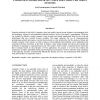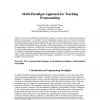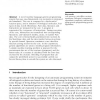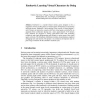853 search results - page 29 / 171 » Dyslexia and learning computer programming |
100
click to vote
ITICSE
2003
ACM
15 years 5 months ago
2003
ACM
In this paper we present a new learning environment to be used in an introductory programming course for students that are non-majors in computer science, more precisely for multi...
108
click to vote
WSCG
2001
15 years 1 months ago
2001
Research performed in the field of computer vision has steadily ignored recent advances in programming tools and techniques, relying on well-established traditional methods, such ...
123
click to vote
FECS
2006
15 years 1 months ago
2006
: Selecting an appropriate programming paradigm in which to teach the first programming and problem solving course in a Computer Science undergraduate program has been discussed ex...
140
click to vote
ALIFE
1999
15 years 3 days ago
1999
A novel machine language genetic programming system that uses one-dimensional core memories is proposed and simulated. The core is compared to a biochemical reaction space, and in ...
123
click to vote
ICIDS
2010
Springer
14 years 9 months ago
2010
Springer
Emohawk is a narrative-based serious game designed to be a supportive tool for teaching basics of virtual agents development at universities and high-schools. Emohawk is built util...




